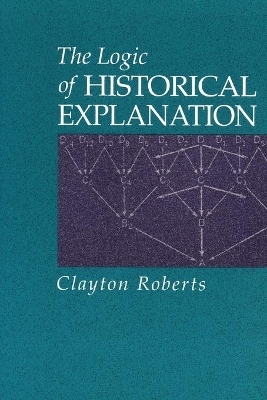
The Logic of Historical Explanation
Seiten
1996
Pennsylvania State University Press (Verlag)
978-0-271-01443-2 (ISBN)
Pennsylvania State University Press (Verlag)
978-0-271-01443-2 (ISBN)
- Lieferbar (Termin unbekannt)
- Versandkostenfrei innerhalb Deutschlands
- Auch auf Rechnung
- Verfügbarkeit in der Filiale vor Ort prüfen
- Artikel merken
This text provides a key to understanding the role of covering laws in historical explanation by distinguishing between their use at the macro- and micro-levels. It illustrates that "covering laws" are indispensable in connecting the steps in an explanatory narrative.
Ever since 1942, when Carl Hempel declared that historical events are explained by subsuming them under laws governing the occurrence of similar events, philosophers have debated the validity of explanations based on "covering laws." In The Logic of Historical Explanation, Clayton Roberts provides a key to understanding the role of covering laws in historical explanation. He does so by distinguishing between their use at the macro- and micro- levels, a distinction that no other scholar has made.
Roberts contends that the positivists were right to believe that covering laws are indispensable in historical explanations but wrong to think that these laws apply to macro-events (such as wars and revolutions). Similarly, the humanists were right to declare that historians do not explain the occurrence of macro-events by subsuming them under covering laws but wrong to deny the role of covering laws in tracing the course of events leading to the macro-event. Roberts resolves this debate by showing that, though useless in explaining macro-events, covering laws are indispensable in connecting the steps in an explanatory narrative. He then sets forth the logic of an explanatory narrative, explores the nature of rational explanation, and distinguishes the logic of historical interpretation from the logic of historical explanation.
Ever since 1942, when Carl Hempel declared that historical events are explained by subsuming them under laws governing the occurrence of similar events, philosophers have debated the validity of explanations based on "covering laws." In The Logic of Historical Explanation, Clayton Roberts provides a key to understanding the role of covering laws in historical explanation. He does so by distinguishing between their use at the macro- and micro- levels, a distinction that no other scholar has made.
Roberts contends that the positivists were right to believe that covering laws are indispensable in historical explanations but wrong to think that these laws apply to macro-events (such as wars and revolutions). Similarly, the humanists were right to declare that historians do not explain the occurrence of macro-events by subsuming them under covering laws but wrong to deny the role of covering laws in tracing the course of events leading to the macro-event. Roberts resolves this debate by showing that, though useless in explaining macro-events, covering laws are indispensable in connecting the steps in an explanatory narrative. He then sets forth the logic of an explanatory narrative, explores the nature of rational explanation, and distinguishes the logic of historical interpretation from the logic of historical explanation.
Clayton Roberts is Professor Emeritus of History at The Ohio State University. His previous books include The Growth of Responsible Government in Stuart England (2008).
| Erscheint lt. Verlag | 15.4.1996 |
|---|---|
| Verlagsort | Pennsylvania |
| Sprache | englisch |
| Maße | 152 x 229 mm |
| Gewicht | 581 g |
| Themenwelt | Geisteswissenschaften ► Geschichte ► Geschichtstheorie / Historik |
| Geisteswissenschaften ► Philosophie ► Erkenntnistheorie / Wissenschaftstheorie | |
| ISBN-10 | 0-271-01443-1 / 0271014431 |
| ISBN-13 | 978-0-271-01443-2 / 9780271014432 |
| Zustand | Neuware |
| Haben Sie eine Frage zum Produkt? |
Mehr entdecken
aus dem Bereich
aus dem Bereich
Russland, die Ukraine und der Westen
Buch | Softcover (2024)
De Gruyter (Verlag)
39,95 €
Geschichte und Theorie
Buch | Softcover (2024)
De Gruyter Oldenbourg (Verlag)
24,95 €
wie Irritationen historisches Denken anregen
Buch | Softcover (2024)
Kohlhammer (Verlag)
69,00 €


